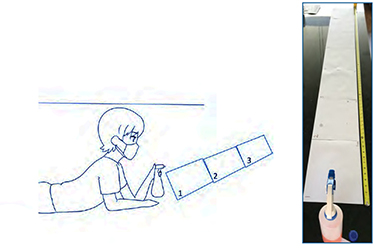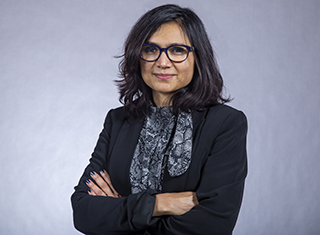Communication Expert Helps Create Education Module on Facemasks to Stop COVID-19 Spread

The effectiveness of facemasks to prevent the spread of COVID-19 has been debated since the start of the current pandemic. To separate fact from fiction, eight scientists and communicators from Brazil, Canada, Colombia, Ecuador, France and the United States convened in May to create an educational module that turns learners into “citizen scientists” regarding the physics of liquid droplets, and the efficacy of filtration and facemask usage.
The team, which includes Rukhsana Ahmed, associate professor and chair of Communication at UAlbany, officially launched the module initiative this past Thursday with a peer-reviewed opinion article, “A Citizen Science Facemask Experiment and Educational Modules to Improve Coronavirus Safety in Communities and Schools,” published in the journal Frontiers in Medicine.
The release of the modules now, said the authors, is particularly timely in reinforcing that facemasks are an essential tool in controlling the pandemic. Children, they note, are now returning to densely attended schools and a second wave of the virus by the end of the year is a possibility.
The set of four modules, released in English, Spanish, French and Portuguese and usable by learners from the third grade level to adulthood, deals with the virus-spreading risks presented by airborne droplets from talking, coughing and sneezing, and the effectiveness of two-layer textile facemasks in stopping 97-99.7 percent of droplet dispersion.

The science is based upon two peer-reviewed studies conducted at the Case Western Reserve University School of Medicine, where the citizen science modules’ principal investigator, Alex Rodriguez-Palacios, is an assistant professor. Rodriguez-Palacios, in one of the studies, used mice born and raised with no germs (germ-free) to show that two-layer cotton textiles are 100% efficient at protecting individuals from germ-carrying microdroplets.
His other study showed how masks made from common household textiles reduced “environmental droplet contamination” from coughing/sneezing/speech, a fundamental goal in reducing COVID-9 transmission.
While these studies are not directly described in the module, said Ahmed, they created the basis for its appealing nature as a teaching tool, which “unequivocally helps children to retain and re-affirm such an important practical knowledge.”
“In the modules,” said Ahmed, “the complexity of the real lab experiments are simplified and enriched to allow teachers and the community to carry out the experiments themselves and determine quantitatively, for instance, how good masks are, how well they work and how many saliva droplets we produce per word when we speak.”
Ahmed helped through the process of the module’s creation and lent guidance on principles of communication to prevent biases or stereotypes and “to ensure we could appeal to the majority promoting education in both the manuscript and the module. A very enriching experience for all involved. Teachers now have the opportunity to correct the scientific record within the communities, and help educate today's children for future pandemics.”
The educational modules are of varying academic difficulty and present four simple home experiments that include a way for teachers to share results and offer feedback. The “citizen scientists” make simulations with clouds of sprayed droplets using safe household liquids.
The modules also include:
- Facemask materials, a nature video, and a video of a slow-motion sneeze
- Tools to visualize how microdroplets can cause contamination, how face covers work and the importance of using a face cover during a pandemic
- Ways to share results as part of a global science project
- Online documents to enter results of the four experiments
- Multiple choice questions to test what the citizen scientists have done
- A glossary and websites for other resources
- Graphs on participation by date, age, grade level, country/location
“We hope many institutions will adopt this module officially or create education strategies around it to help educate the public and incentivize science-based solidarity and common knowledge, especially children who will then educate their parents and friends,” said Ahmed. “Children are very critical when you provide them with practical knowledge.”




